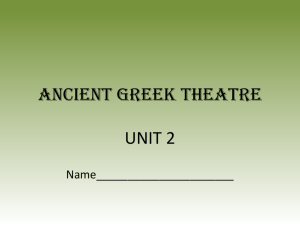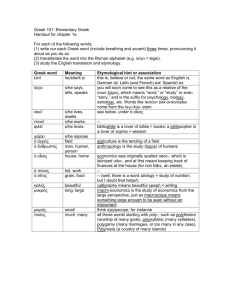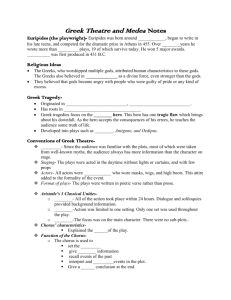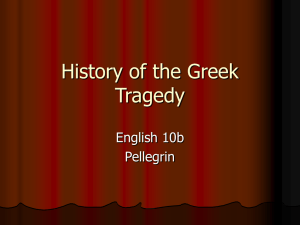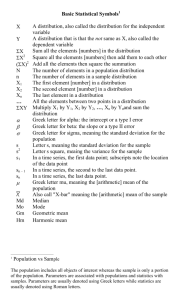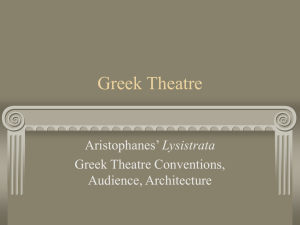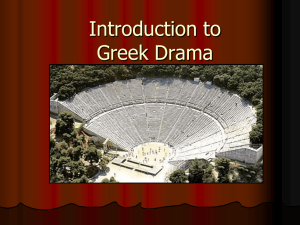Ancient Greek Theatre & Medea Powerpoint
advertisement
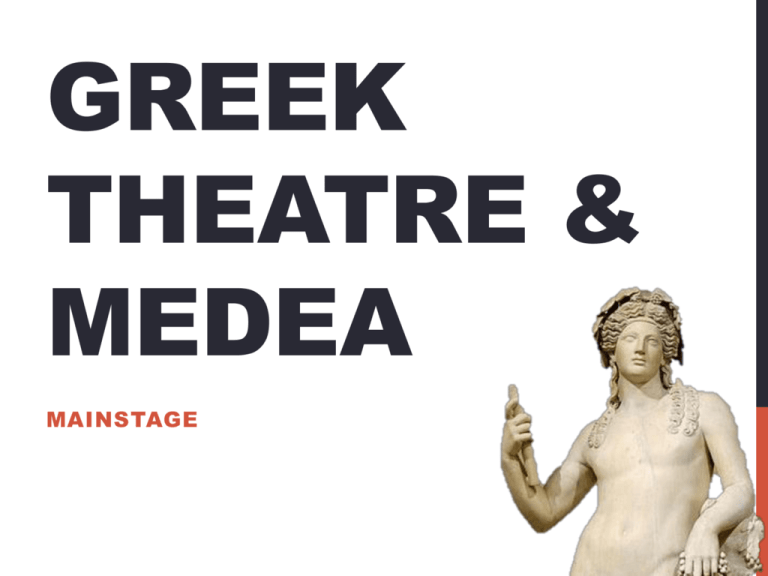
GREEK THEATRE & MEDEA MAINSTAGE GREEK TRAGEDY • The Greek tragedy started in the form of dithyrambs. • Dithyrambs: choral hymns to the god Dionysus • Thespis is thought to be the playwright that moved theatre from this form of poetry to the classical form of Greek tragedy. • Did this by allowing actors to speak as individuals in their own voice, rather than singing as a group • Despite the fact that the influence of Thespis is not agreed upon, to this day actors are known as thespians in his honor. STRUCTURE OF GREEK PLAYS • Actors usually played more than one role • Men played all the parts • Stylized - used masks, choruses, etc. • Violence and death usually offstage • Frequent use of messengers to relate information • Usually continuous time of action • Usually single place • Stories based on myth or history, but varied interpretations of events • Focus is on psychological and ethical attributes of characters, rather than physical FOUR QUALITIES OF GREEK TRAGEDIES 1. Performed for Special Occasions Athens had four festivals worshipping Dionysus. • Dionysus: according to Greek mythology, the god of wine, fertility, and rebirth. • The son of Zeus (King of the Gods) and Semele (a mortal) 2. Competitive Prizes were awarded, and Thespis is believed to be the first theatrical contest winner. The most famous of all Greek Tragedies, “Oedipus Rex,” finished second around 430 BCE. 3. Plays Closely Related to Religion • Most stories focused on the gods, myths, and history • Each playwright had his own interpretation of such events FOUR QUALITIES OF GREEK THEATRE 4. Had a Chorus • Singing was an important part of the foundation of theatre (dithyrambs) • Moved from being the entire performance to contained within the chorus. • Chorus: a group of actors singing/speaking together • Offer a variety of background and summary information to help the audience follow the performance • Represent the population in any particular story • Comment on themes and shows how an ideal audience might react to the drama • Express to the audience what the main characters could not say, such as their fears or secrets • Usually communicated in song form but sometimes spoke their lines in unison. • Added movement, spectacle, song, and dance GREEK TRAGEDIAN: EURIPIDES Euripides (ur/ip/i/des) (480-406 B.C.) • Very popular in later Greek times, little appreciated during his life • Sometimes known as “The Father of Melodrama” • Subjects questioned traditional values • Used minor myths or severely altered major ones • Used less poetic language, but more realistic characters and dialogue • Most famous plays: Medea, The Trojan Women and The Bacchae MEDEA • First produced around 431 BC • Based on a myth – Medea is a sorceress who was the daughter of a king, niece of goddess of magic Circe, granddaughter of sun god Helios who helps Jason, a hero & leader of the Argonauts, find the Golden Fleece. They get married, she leaves her home to be with him, and they have 2 sons. • Not received well at the time (3rd place = last) – probably because it was both shocking and unconventional (indecisive chorus, etc.) • Considered one of first works of feminism • Is the most popular Greek tragedy to be performed through the 20th century
